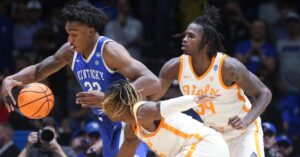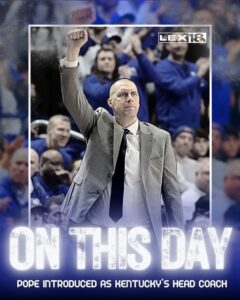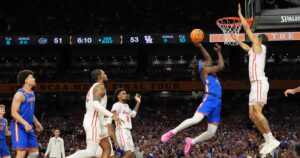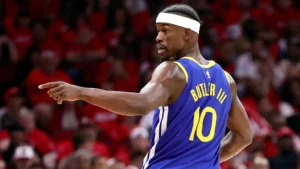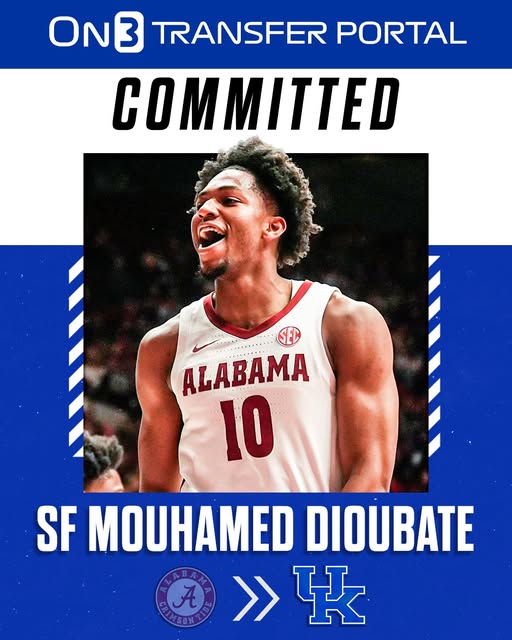
In the fast-paced, high-stakes world of college sports, particularly in football and basketball, the decision to transfer from one institution to another is often met with both excitement and trepidation. Players wrestle with a multitude of factors, from athletic development to personal growth, team dynamics, and academic opportunities. For Mouhamed Dioubate, a talented athlete with great potential, his choice to transfer from Alabama to Kentucky in 2024 marked a pivotal moment in his athletic career and personal journey. This transfer decision did not just impact Dioubate’s athletic trajectory but also rippled through the basketball landscapes at both Alabama and Kentucky. By examining the intricacies of his transfer, we can gain insight into his motivations, the broader implications of this move for both universities, and how it reflects the broader trends in collegiate sports.
Background of Mouhamed Dioubate
Before diving into the specifics of his transfer, it is essential to understand who Mouhamed Dioubate is and what he brings to the table. Born in the United States to West African parents, Dioubate developed a passion for basketball at an early age. His blend of athleticism, agility, and strong basketball IQ caught the attention of college scouts during his high school career, where he was known for his versatility, strong defense, and explosive playmaking abilities. These qualities eventually led to his recruitment by the University of Alabama, one of the premier basketball programs in the Southeastern Conference (SEC).
At Alabama, Dioubate was immediately seen as a player with great upside. His potential as both a scorer and a defender drew attention, and while his freshman year showed promise, it was clear that his development would require time, mentorship, and the right environment to fully flourish. Throughout his early years at Alabama, Dioubate displayed flashes of brilliance but struggled with consistency, something that is common for young players adjusting to the rigors of major college basketball.
The Decision to Transfer
In early 2024, the news broke that Dioubate would be transferring from Alabama to the University of Kentucky. This announcement came as a surprise to many, given that Dioubate had only spent a short time at Alabama and had the opportunity to continue his development under the tutelage of head coach Nate Oats. However, upon closer inspection, several factors help explain Dioubate’s decision.
1. Playing Time and Role
One of the most common reasons athletes choose to transfer is the lack of playing time or the desire for a more prominent role within a program. At Alabama, Dioubate found himself in a competitive roster, where the depth of talent often led to limited minutes on the court. With Alabama’s emphasis on a fast-paced, high-scoring offense and tough defense, finding a place in the rotation was challenging for a player like Dioubate, who was still refining his skills.
At Kentucky, however, Dioubate saw an opportunity to carve out a larger role. The Wildcats have a storied history of developing talented players, and Coach John Calipari’s reputation for working with young talent is renowned. Kentucky’s roster, while talented, presented Dioubate with the chance to contribute immediately, especially considering Kentucky’s focus on integrating athletic, versatile players into their system. This move allowed him to potentially earn more playing time and grow as an athlete in a more nurturing environment for his development.
2. Coaching Style and Development
Another major consideration in Dioubate’s transfer was the style of coaching and development at both Alabama and Kentucky. While Coach Oats at Alabama is known for his emphasis on tempo, three-point shooting, and defensive schemes, Coach Calipari’s reputation revolves around developing players for the next level, particularly the NBA. Calipari’s track record of producing NBA-caliber players is unparalleled, with stars like Anthony Davis, John Wall, and De’Aaron Fox having all emerged under his guidance.
For Dioubate, the prospect of being mentored by Calipari, who is known for developing players who possess the kind of skill set Dioubate brings to the table, likely played a crucial role in his decision. Kentucky’s emphasis on player development, particularly for NBA-bound athletes, provided Dioubate with the opportunity to sharpen his game under the guidance of one of the most successful coaches in college basketball. Furthermore, Kentucky’s program has a reputation for preparing athletes for the next level, and for a player like Dioubate, who is aspiring to play professionally, this was a compelling reason to transfer.
3. System Fit
In terms of system fit, Kentucky’s style of play may have also been a better match for Dioubate’s skill set. Known for running a balanced offense with the ability to transition quickly between offense and defense, Kentucky’s system may offer more opportunities for Dioubate to showcase his athleticism. His strengths lie in his ability to defend multiple positions, rebound effectively, and finish in transition—attributes that align well with Kentucky’s fast-paced, high-pressure style.
At Alabama, the focus was on developing a more structured offense with a reliance on shooting from the perimeter, which may not have always played to Dioubate’s strengths. In contrast, Kentucky’s system seemed to offer the promise of a more well-rounded approach that would better leverage Dioubate’s unique skill set and allow him to play a more prominent role.
4. Team Chemistry and Environment
While the tactical and coaching aspects played a significant role, the team environment and culture were also crucial in Dioubate’s decision-making process. At Alabama, Dioubate was part of a team with high expectations but also intense competition for roles. The pressures of competing within such a deep roster can sometimes lead to dissatisfaction or frustration, especially for players who are not seeing the court as much as they would like.
Kentucky, on the other hand, is known for its more inclusive and cohesive team culture. Under Calipari, the Wildcats emphasize a “player-first” mentality, where individual development is prioritized within the context of team success. Dioubate’s transfer to Kentucky may have been fueled by the promise of a more nurturing environment that would allow him to grow both as a player and as a person.
The Broader Implications of the Transfer
While Dioubate’s decision is ultimately a personal one, it has larger ramifications for both Alabama and Kentucky. For Alabama, losing a promising player like Dioubate is undoubtedly a setback. However, Coach Oats has built a strong program that is capable of attracting and developing top-tier talent, so the loss of Dioubate is not insurmountable. Alabama will likely continue to recruit high-caliber athletes to replace him, but it does highlight the competitive nature of modern college basketball, where players are constantly seeking opportunities that align better with their personal goals and development.
For Kentucky, the addition of Dioubate is a significant one. The Wildcats will benefit from his athleticism, versatility, and potential as a two-way player. Kentucky has been known to develop high-level defenders who can also contribute on offense, and Dioubate fits this mold perfectly. His arrival further bolsters an already competitive team and adds depth to their rotation, which will be crucial as they aim to compete for championships in the coming seasons.
Mouhamed Dioubate’s decision to transfer from Alabama to Kentucky was not made in isolation. It reflects the complexities of modern college sports, where athletes are constantly evaluating their opportunities for growth, both on and off the court. Dioubate’s transfer was driven by a combination of factors, including the desire for more playing time, a better system fit, and the opportunity to develop under one of the best coaches in college basketball.
For both Alabama and Kentucky, this move has profound implications. While Alabama loses a talented player, Kentucky gains a versatile athlete who could make a significant impact in the upcoming seasons. Ultimately, Dioubate’s transfer is a reminder of the ever-evolving nature of college athletics, where the pursuit of success and development is a constant balancing act for both players and programs alike.
